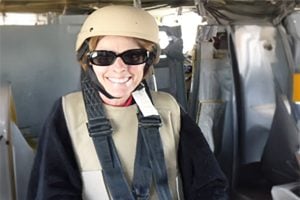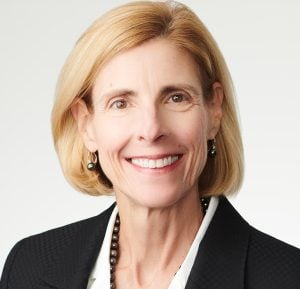
Teresa Shea, ’87 (MS), is president of the strategic consulting firm Oplnet, and an independent board director and advisor for companies and nonprofits. Previously, she served more than three decades at the National Security Agency (NSA) where she rose to the level of director of Signals Intelligence (SIGINT), acting as principal advisor to the director of the NSA, director of national intelligence, four-star military commanders, and cabinet-level government officials.
Shea holds a Bachelor of Science in electrical engineering from Georgia Tech and a Master of Science degree in electrical engineering from John Hopkins.
Your career with the NSA began with a summer internship during your undergraduate years—what advice would you offer students preparing to launch their careers?
There’s a lot that students can focus on in the technical realm, but they should also develop what have traditionally been called “soft skills,” such as the ability to break down complex problems, critical thinking, and problem-solving, as well as working on their communication skills.
I encourage every student to practice public speaking, to join a club and to participate in group projects. As painful as that is for many of us, no one gets anything done on their own. We are increasingly working in teams and across aisles, with collaboration and group projects. Doing that as a student gets you more comfortable in that space.
As a working professional, how do you keep up-to-date with your field?
If I have to take an exam, then I’m going to be motivated to learn the material. I have to be a constant learner because technology is changing so fast. To keep my competency up, I actively seek out formal avenues, pursue a lot of certifications, and listen to a lot of podcasts, webinars, and lectures.
Can you share a memorable experience from your time at Hopkins?
 Merrill Skolnick was a world-class radar expert who had written numerous textbooks. When I took his class, I was very intimidated, but he was one of the best professors I ever had at Hopkins. He not only was very intellectually smart but he was also very practical and gave us lessons we could apply in real life. I remember distinctly the one-on-one oral exam that he gave me—talk about being intimidated! It forced me to think on my feet and to convey my critical thinking in a way that passed muster on the spot. That was an invaluable lesson and confidence builder.
Merrill Skolnick was a world-class radar expert who had written numerous textbooks. When I took his class, I was very intimidated, but he was one of the best professors I ever had at Hopkins. He not only was very intellectually smart but he was also very practical and gave us lessons we could apply in real life. I remember distinctly the one-on-one oral exam that he gave me—talk about being intimidated! It forced me to think on my feet and to convey my critical thinking in a way that passed muster on the spot. That was an invaluable lesson and confidence builder.
Have you experienced similar challenges in your professional career?
When I started working, it was back when “girly” pictures hung on the wall of lab benches. It was a different time. As a female engineer, I always felt like I was being judged differently. To be clear, I was the one who felt that way: The people around me didn’t intend for me to feel that way, but I never felt like I was good enough.
I learned that if I spoke up, put myself out there, and took risks, then it became more and more of an inclusive team environment. I also made sure that I worked with good people who were smarter than me, and I listened to and learned from them.
It’s gotten better since then, but we’re not there yet and still have a lot of work to do. One of my passions is women in technology and promoting girls and women at all stages in their careers. I feel very optimistic for my granddaughters’ futures.
Can you share a pivotal moment that shaped your confidence as a leader?
When I got to be a senior executive, I thought, ‘I’ve made it, I’m a leader now.’ But honestly, there’s nothing that really changes. You’re still you. For example, there was a time that I was summoned to go to the deputy director’s office. I had never met him, so I thought, ‘I’ve done something wrong. This is going to be a bad thing.’ I fretted all night but then the next day, he told me that he wanted me to be the chief of an emerging organization dealing with computer network exploitation.
My immediate response was, ‘I’m not qualified.’ But I ended up taking the job, and it was the best thing that ever happened and an extremely rewarding experience. I learned from taking that risk and just doing the things I always did: hiring amazing people and building teams.
Great teams build great capabilities and results. I was in the NSA for 34 years—my job was to bring everybody together as a leader, so I always put people first. That was always my priority.
Your many recognitions include the President’s Distinguished Rank Award from George W. Bush and Barack Obama, the National Intelligence Distinguished Service Medal, and the Department of Defense Medal for Distinguished Civilian Service. What are you most proud of?
When someone is in the government for a long time, they get lots of plaques, awards, and other items when they leave. The one thing that I keep in my office is a letter that I got from a platoon leader in Afghanistan who thanked us for saving the lives of his platoon. That’s not something that you typically get credit for, but it’s certainly why I and so many others loved the work.
The other thing that I am most proud of is my two daughters who are phenomenal women. It isn’t easy raising children while you’re having a career, and I’m so proud of them and all that they do.